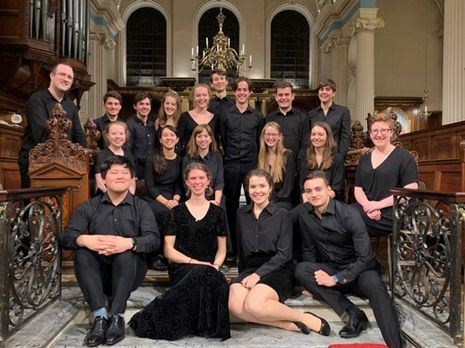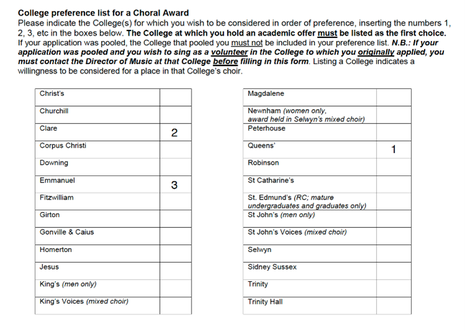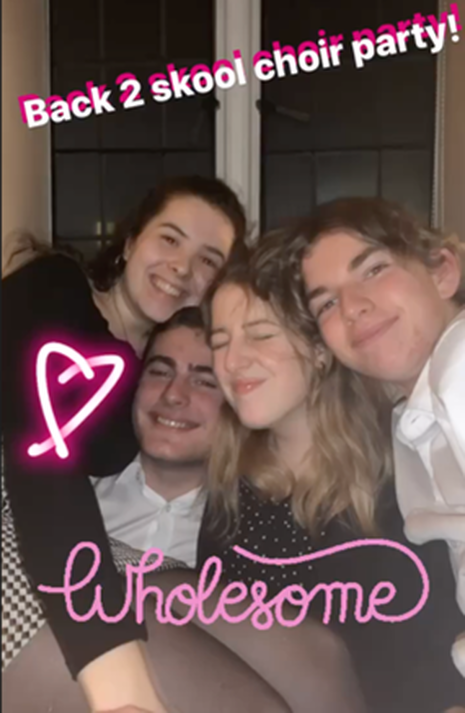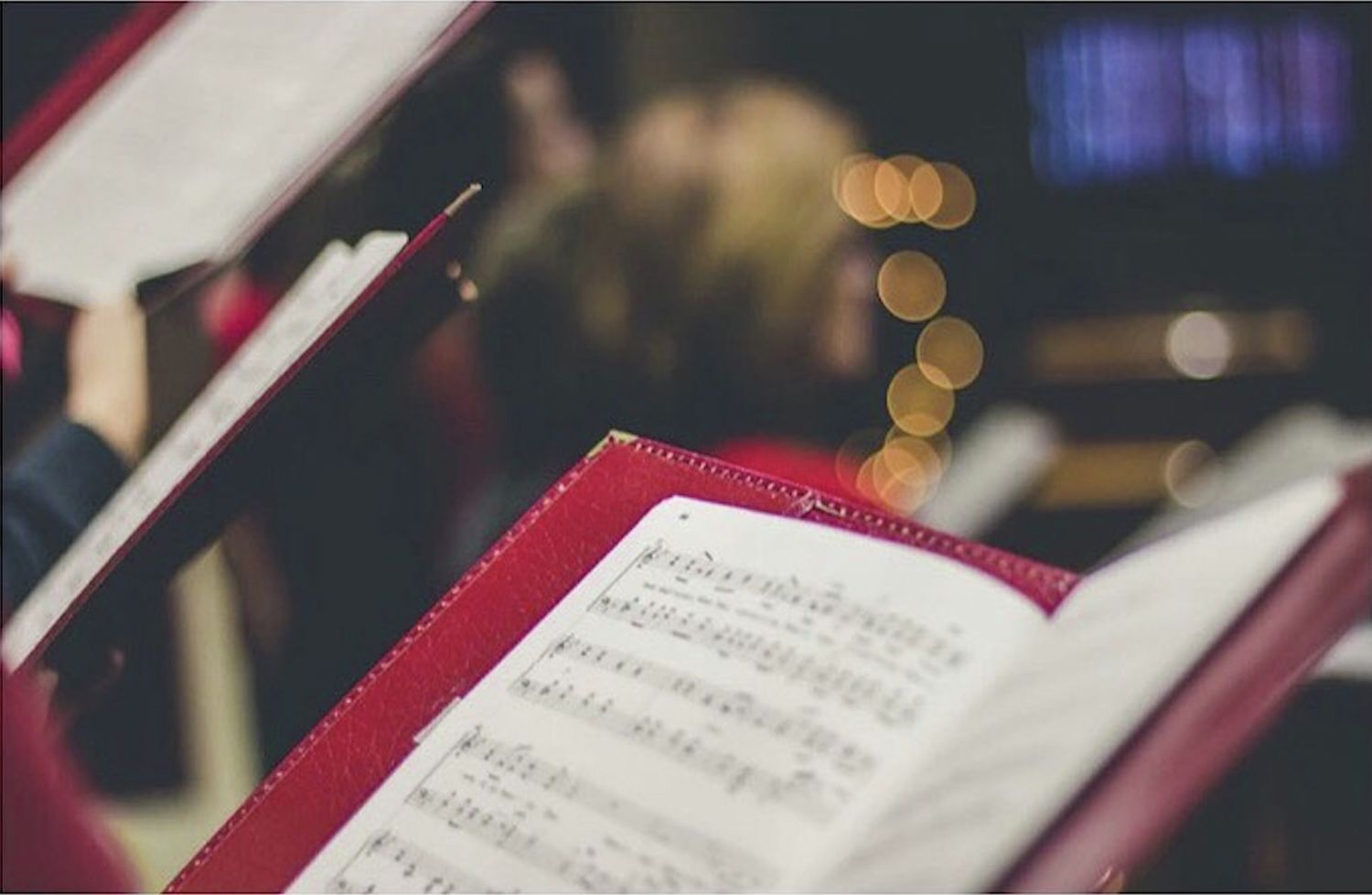A Love Letter to Emmanuel College Chapel Choir
Rosie Aylard sings the praise of Emmanuel’s choral community

When talking to people about my life in Cambridge, the question that comes up the most is: “Why do you sing in Emmanuel Choir if you go to Queens’?”. This is a very good question, and requires an explanation of the choral scholarship audition process in Cambridge. My decision to apply for a choral scholarship was, in a manner which would foreshadow the majority of my Cambridge life, extremely last-minute. Encouraged by the head of music at my school and my ever-faithful mother, I downloaded the application form just a few days before the deadline. Upon reading the form, I was confused to find that I had to indicate other colleges whose choirs I would be interested in joining. Having no idea what the reputation of each choir was, I put down Emmanuel and Clare, simply because I remembered them being pretty and friendly when I looked around Cambridge.
After a very relaxed and welcoming day of auditioning, I received an email from the director of chapel music at Emmanuel, asking if I’d like to be a choral volunteer in their choir. [The term ‘volunteer’ just means you’re singing at a different college.] After getting over my slight disappointment that I wouldn’t be singing in my own college’s choir, I soon became excited at the prospect of getting to know another college and its community.

This excitement soon turned into dread as I arrived in Cambridge and the inevitable imposter syndrome began to convince me that I wouldn’t be good enough for a Cambridge chapel choir. After my first rehearsal, I was determined to quit, because I felt completely out of my depth among so many talented choral singers, who seemed to know exactly what they were doing, confidently sight-reading complicated music and grasping forms of notation, like psalms, which I had never seen before.
Fortunately, a friendly second year spoke to me after the rehearsal, having clearly picked up on the panicked fresher/deer in headlights look on my face, and convinced me that it would get easier. Even more fortunately, she turned out to be right. Still, I began my first term in choir desperately trying not to be heard for fear of making mistakes, but with the encouragement of the other members, my confidence began to grow. An example of this was being told by a fellow member that the worst thing about my voice is that I don’t sing loudly enough.

Singing in a Cambridge chapel choir was like no musical challenge I had ever tackled before. The standard and dedication of the singers and our director, the varied repertoire ranging from classic canticle settings to original compositions written by members of choir, to acapella arrangements of Mariah Carey’s timeless classic, All I Want for Christmas is You. Ploughing through enough music to fill 2 services a week, the occasional weekend performance of Handel’s Messiah, and one performance of Elgar’s The Dream of Gerontius in Hampstead Parish Church, was exhausting but incredibly rewarding. I felt my singing improve week-on-week.
In spite of this, what surprised me most about the choir was the sense of community, and even family. We are lucky enough to go to formals every Sunday after evensong (pre-Covid, of course), which provides the perfect opportunity to catch up with everyone in choir. Everyone has such hectic weekly schedules, so that free food is often the only way to get people to congregate.
“Anyone who said that rowing is a cult has clearly never witnessed a choir party”
The choir is made up of singers from all across Cambridge, from Girton to Trinity to Homerton, studying anything from archaeology to medicine to law, and being able to spend time with new people solely through choir, is truly a blessing. Uncharacteristically for Cambridge, there is no sense of competition between members of the choir. There are no rankings for who has the biggest range, no grading for how well you can sight-read intervals, everyone is there purely for the joy of creating music with likeminded singers. I felt this sense of support most strongly when I reluctantly sang my first solo. I irritated my neighbours for days with the sound of me practising my 12 bars of solo ringing through the criminally thin walls of our first-year accommodation in the days leading up to the service, and hoping that it would eventually sound nice. On the first day of rehearsing this piece, my hands were shaking so hard that the sound of paper rustling was almost as loud as the organ accompaniment. I sang the solo, and when I finished everyone – seeming slightly stunned that I could actually sing loudly – began to clap. That day, I finally felt confident in the choir, that I was good enough, and I had earned the right to be there.
An equally bizarre and joyful experience is the tradition of choir parties. Anyone who says that rowing is a cult has clearly never been to a choir party. I wish I could write about this experience, but I think to try and put it into words would be to deny their indescribable magic. Besides, some traditions are best kept under a shroud of mystery.
We do like our ducksWe would like to draw your attention to the following duck. It is not one of our ducks, but it is nevertheless a very good duck. https://t.co/8PEbr0iawN
- Emmanuel Choir (@EmmanuelChoir) March 29, 2020
Feeling part of a different college’s community is an immense joy, and feeling valued as part of that community is a very special feeling. It is also a huge privilege, as the college has treated us to amazing formal dinners, and opportunities to sing for some amazing audiences. Even in the ordinary day-to-day, leaving my own college three times a week to go and spend hours in the Emmanuel chapel provided me with immense solace at times when work was overwhelming, when I felt homesick, or when I had been chained to my desk all weekend. It is also well-researched that singing in groups is hugely beneficial to mental health, something which we can often forget about in the eternally hectic hamster-wheel of a Cambridge term.
I will sing the praises of Emmanuel college chapel choir and the beauty of choral music for years to come, but for now I will end this love letter with some thank yous. To Peter Foggitt, for taking me on as a panicked fresher who could never find her music. To Joe Penny, who agreed to join me in Emma choir having only met me 5 days earlier and has since made every rehearsal a thousand times more fun. To everyone in Emma Choir, for being the best cheerleaders, musicians, and friends I could have asked for.
If you’re interested in joining a college chapel choir, send an email to the director of chapel music, I’m sure they’ll love to hear from you!
 News / Report suggests Cambridge the hardest place to get a first in the country23 January 2026
News / Report suggests Cambridge the hardest place to get a first in the country23 January 2026 Comment / Cambridge has already become complacent on class23 January 2026
Comment / Cambridge has already become complacent on class23 January 2026 News / Students condemn ‘insidious’ Israel trip23 January 2026
News / Students condemn ‘insidious’ Israel trip23 January 2026 Comment / Gardies and Harvey’s are not the first, and they won’t be the last23 January 2026
Comment / Gardies and Harvey’s are not the first, and they won’t be the last23 January 2026 News / Cambridge ranks in the top ten for every subject area in 202623 January 2026
News / Cambridge ranks in the top ten for every subject area in 202623 January 2026










